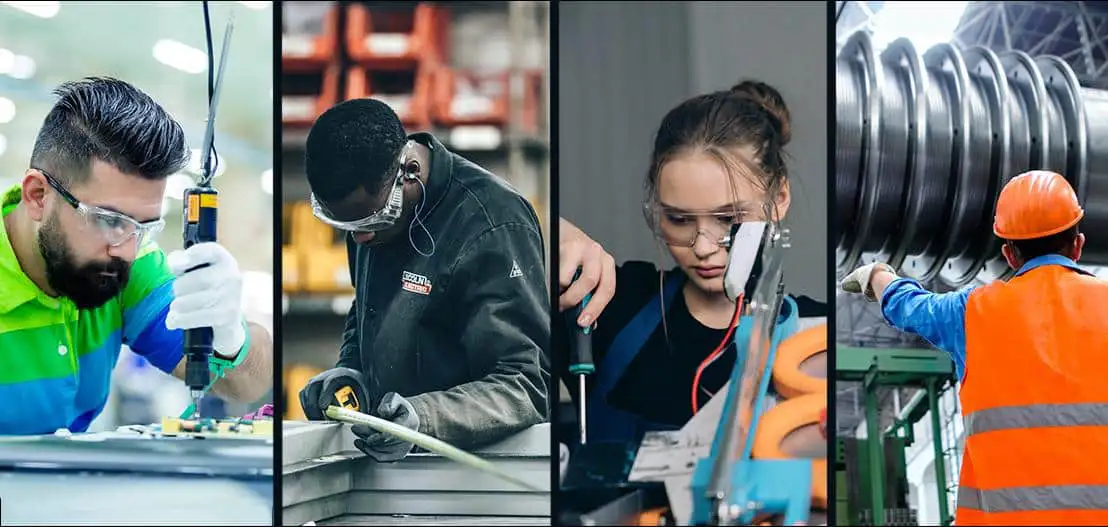According to the latest predictions, the manufacturing industry is expected to face a severe shortage of skilled workers in the next decade. By 2030, around 2.1 million job positions in this sector are likely to remain vacant due to the persistent challenges of finding individuals who possess, or are willing to acquire, the constantly-evolving skill sets needed to thrive in this field. One of the best ways companies can overcome this talent challenge is to rethink their approach to candidate assessment. Specifically, by using a pre-employment manufacturing assessment test that evaluates critical soft skills (or power skills) as well as existing hard skills, employers can significantly improve their chances of identifying the candidates most likely to succeed now, develop new skills on the job, and continue to thrive as the state of the industry evolves.
Here are a few things to consider as you’re shopping around for the right manufacturing assessment or test for your company:
Table of Contents
1. Manufacturing assessments for hard skills
2. Manufacturing aptitude tests for soft or power skills
3. Top competencies for common manufacturing roles
4. Why multi-measure tests are crucial for manufacturing
Manufacturing assessments for hard or technical skills
This category of manufacturing tests measures a candidate’s technical aptitude. In other words, this type of manufacturing aptitude test assesses whether the candidate has the necessary vocational skills and subject matter expertise to hit the ground running.
A technical manufacturing test can range from more specialized, on-the-job knowledge to spatial awareness to mathematics. Some common manufacturing skills test options include:
- Basic machine operator test – A basic machine operator test measures a candidate’s ability to learn to use and maintain various types of equipment machinery. A common machine operator test is the Wiesen Test of Mechanical Aptitude (WTMA).
- Machinist aptitude test – Being a successful machinist requires the ability to apply mechanical knowledge and problem-solving skills to all variety of common and custom jobs. This machinist assessment test measures these abilities by asking candidates how they would handle different scenarios.
- Numerical reasoning test – Many manufacturing roles require workers to able to interpret fairly complicated data. A numerical reasoning test measures a candidate’s acumen for decoding data through graphs or tables.
- Assembly skill test – The assembly skill test replicates the assembly line, as candidates use outlined parts to create a sample product. You can assemble the product either by hand or with machinery to accurately predict its performance.
- Digital literacy test – According to a 2020 study by the National Skills Coalition, 35% of surveyed manufacturing workers have very limited to no digital skills. Yet digital literacy is key to keeping up with ever-changing technological forces. A digital literacy test measures skills related to existing technology and adaptability.
Manufacturing aptitude tests for soft or power skills
Aptitude tests for power skills go beyond hard skills to reveal essential information hard skills assessments aren’t able to.
Multi-measure hiring assessments, for example, assess a candidate’s cognitive ability, personality, and motivation, offering valuable insights into how reliable, motivated, capable, adaptable, and collaborative they’re likely to be (just to name a few). A manufacturing pre-employment test can be the perfect learning tool that helps hiring managers understand the people behind applications on a more advanced level, offering a wide range of benefits to the hiring process and decision-making quality.
Check out this introduction to assessments for more information on why multi-measure assessments are more predictive than simple skills tests, resumes, and cognitive ability, personality, and motivation on their own.
Wonderlic’s multi-measure hiring assessments assess three highly predictive constructs that provide insight into a manufacturing industry candidate’s soft skills:
Cognitive ability

- A cognitive ability assessment or test is the single-best predictor construct for on-the-job performance. This test lets you know if the candidate has the cognitive aptitude needed for the role. This is crucial in manufacturing roles where it’s of the utmost important to follow safety procedures and instructions.
- The measurement of cognitive ability takes into account candidates’ ability to learn, adapt, solve problems, and digest new or complex information.
- Wonderlic created the first short-form cognitive assessment for the workplace. Today, Wonderlic Select’s cognitive ability test uses 50 questions relating to simple math, spatial reasoning, and more.
Question example: If product A takes 30 minutes to assemble, and product B takes 45 minutes to assemble, how long will it take to create 55 units of product A and 25 units of product B?
Personality

- If a candidate is extremely skilled at the role, but they tend to create conflict when working with others, or are unreliable, they’ll likely end up hurting team morale and, in turn, productivity. That’s why assessing personality is so important. Hard skills are teachable, whereas personality is ingrained, affecting how we work on a team and show up every day.
- When you combine a personality assessment with a cognitive assessment, it results in what experts call “incremental validity”. This means that it adds an extra and significant layer of predictive power that neither of them could achieve alone.
- Based on the Five Factor model of personality, Wonderlic Select’s personality assessment measures five key attributes: cooperation, dependability, stress tolerance, sociability, and open-mindedness.
Question example: Ask the candidate to rank a statement on a sliding scale. For example: I like starting conversations with people I don’t know. They would then rate their response from a scale of “Strongly Disagree” to “Strongly Agree.” That response, in combination with all of their other responses, would add up to an overall personality score, tailored to the job they’re applying for.
Motivation

- When you hire a candidate, it’s crucial to make sure that they demonstrate a strong commitment to the role and show genuine enthusiasm for the work they will be doing. A motivation assessment can help clarify to what degree a candidate’s interests align with the responsibilities of a role.
- Unlike a cognitive ability test, there’s no wrong answer with a motivation assessment; they simply measure preferences a candidate has with regard to the types of work they enjoy.
- Wonderlic Select’s motivation assessment was designed based on the RIASEC model, which looks at six characteristics: practical, investigative, artistic, supportive, enterprising, and traditional.
Question example: present the candidate with these types of activities—for example, training new employees, designing a new clothing line, or treating people who have illnesses—and be asked to rank which of them they’d prefer doing the most.
The top competencies required for common manufacturing roles
A manufacturing assessment should be able to identify Attention to detail. Collaboration. Problem-solving and Adaptability.
These are just a few competencies you’re likely focusing on when sourcing manufacturing talent. And the best — and fairest — way to assess them is with objective talent assessment data (as opposed to only looking at a resume and conducting interviews).
Wonderlic’s TrueMatch technology, grounded in O*NET (Occupational Information Network) data from The Department of Labor and data from 10+ million resumes, enables companies to identify high performers for your open manufacturing roles by giving them instant access to 3.5 million job scoring profiles, including hundreds of unique manufacturing-related job profiles.
What does that mean for you? It means the results of every assessment are specific to the job you’re hiring for, no matter how unique. Whether you’re hiring a machine operator or a facilities manager, each candidate’s score for each element of Wonderlic Select’s multi-measure assessment — cognitive ability, personality, and motivation — is scored against that specific job profile, giving you objective, actionable data.
Below are what TrueMatch identifies as the top five competencies (in suggested order of priority) for the 7 most common manufacturing jobs, according to ZipRecruiter:
| Mechanical Engineer |
|---|
| Analytical Thinking |
| Attention to Detail |
| Innovation |
| Dependability |
| Integrity |
| Instrument Technician |
|---|
| Attention to Detail |
| Dependability |
| Integrity |
| Analytical Thinking |
| Independence |
| CAD Draftsman |
|---|
| Attention to Detail |
| Dependability |
| Analytical Thinking |
| Cooperation |
| Integrity |
| Plant Operator |
|---|
| Dependability |
| Attention to Detail |
| Integrity |
| Stress Tolerance |
| Independence |
| Quality Control Inspector |
|---|
| Attention to Detail |
| Dependability |
| Integrity |
| Self-Control |
| Stress Tolerance |
| Machine Operator |
|---|
| Attention to Detail |
| Dependability |
| Cooperation |
| Self-Control |
| Integrity |
| Assembly Line Worker |
|---|
| Attention to Detail |
| Dependability |
| Cooperation |
| Self-Control |
| Independence |
| Sales Representative |
|---|
| Integrity |
| Dependability |
| Initiative |
| Attention to Detail |
| Persistence |
Why multi-measure assessments are crucial for manufacturing
The manufacturing industry is poised to grow in 2024 and beyond, yet thousands of employers are still struggling to find the right people for their open positions.
While technical hard skills and relevant experience obviously remain relevant, hiring on existing skills alone won’t be enough, especially as technology within manufacturing continues to evolve.
Now more than ever, hiring managers should also make it a top priority to evaluate candidates’ power skills — and be more open to considering candidates who may not have all the existing hard skill sets required but whose soft skills assessment results suggest they’d be able to quickly learn on the job.
Wonderlic Select can help you:
- Review resumes faster — Wonderlic Select gives candidates a single score based on their fit for a specific role. This is measured through cognitive ability, personality, and motivation. By sorting out low scores, hiring managers can save hours reviewing resumes.
- Hire the best candidates — The top-scoring candidates will be a high match for your open roles based on their cognitive ability, personality, and motivation — meaning they’ll want to do the job and they can do it well. When evaluating finalists, hiring managers can further drill down into how each applicant fared in any component of the multi-measure assessment. For example, if cognitive ability is specifically important for an engineering role, the hiring manager can take a closer look at those results. This helps ensure hiring managers are hiring best-fit candidates every time.
- Reduce turnover and boost productivity — Because you’re hiring employees who want to do the job and are a good fit for the job, these candidates will be more likely to not only excel in their roles but stay at your company for a long time.
- Improve company culture and morale — Hiring top candidates who are also team players helps create a cooperative culture of excellence and hard work.
Schedule your Wonderlic Select demo today, or dig into our website first to learn more.






